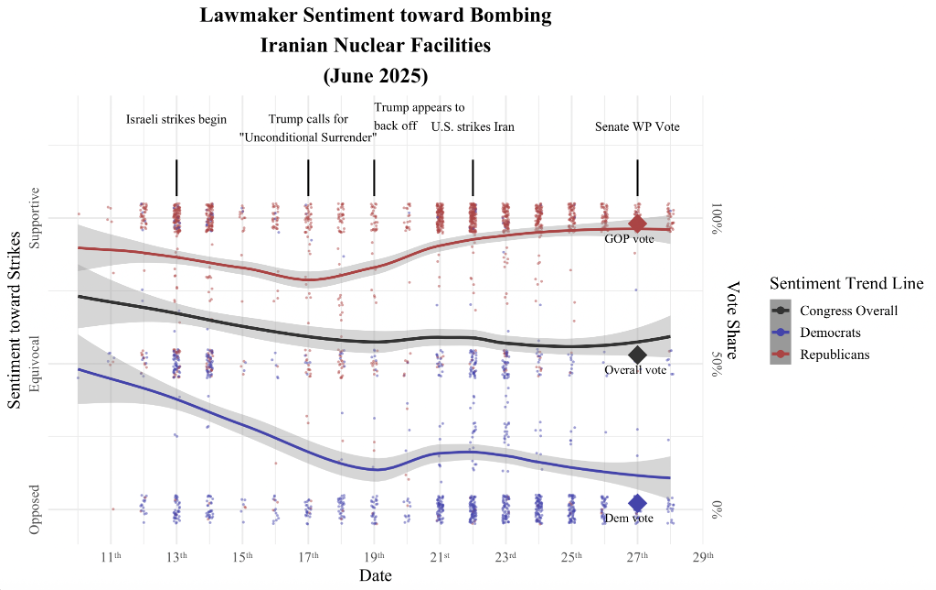Evaluating Congressional Sentiment Toward the Iran Strike
Media commentary suggested that President Trump’s June airstrikes overrode broad congressional opposition. The truth is more nuanced.

On June 21, U.S. forces carried out a bombing attack on three nuclear sites in Iran, marking the first time since 1979 that the U.S. has struck the nation. If some reports are to be believed, President Trump’s strike flew in the face of almost unanimous Democratic—and even meaningful Republican—opposition in Congress. Whatever the substantive merits or failings of Trump’s attack, however, it is not true that Congress has largely opposed it. Indeed, it appears to have enjoyed slight majority support, both prior to and after the strike.
Over the past few weeks, journalists have actively and admirably reported on congressional activity regarding a prospective U.S. use of force against Iran. Some accounts, though, suggest that the president defied a dovish Congress. A great deal of attention, for example, has been given to efforts by lawmakers in the House and Senate to invoke the War Powers Resolution—which would have blocked further use of force without congressional approval—as well as the introduction of resolutions designed to limit Trump’s ability to use military force against Iran. Yet this reporting risks overstating the depth and breadth of congressional resistance, and understating support.
To be sure, measuring congressional sentiment is no easy task. The body consists of 535 individual lawmakers, each of whom may issue shifting statements as a crisis progresses—documenting the totality of expressed opinion over time toward an important foreign policy move in a short journalistic story is impossible. Yet political science scholarship emphasizes the importance of public-facing congressional activity. Congressional messaging can shape public opinion about foreign policy, which presidents care about.
To catalog the universe of expressed congressional sentiment toward striking Iran, we turn to large-scale data and computational techniques. Using real-time data on the universe of legislator messaging (press releases, Facebook posts, tweets, committee hearing statements, and floor speeches) and artificial intelligence (AI) classification models, we demonstrate how expressed congressional opinion about an American strike evolved over the crucial period between June 10—several days before International Atomic Energy Agency (IAEA) inspectors found Iran to be noncompliant—and June 27, the date of the war powers vote taken in the Senate. To maximize accuracy, each congressional communication was classified by three different large language models, or LLMs (OpenAI’s GPT-4o, Athropic’s Claude 4 Sonnet, and Google’s Gemini Flash 2.5); we used the majority assessment. To our knowledge, this is the richest existing empirical account of expressed congressional opinion on the Iran strike.
Figure 1 presents legislator position-taking toward striking Iran, by day. Each dot represents a specific legislator’s aggregate expressed sentiment on a particular day, with blue dots representing Democrats and red dots representing Republicans. We average the expressed stance of legislators who issued more than one statement on a given day—that is why some dots appear between outright positions. We include three smoothed lines that depict average expressed sentiment among Republicans (red), Democrats (blue), and Congress overall (black). In aggregate, the data suggests the strikes enjoyed slight majority support in Congress. We have also included the vote share found in each of these groups with regard to S.J.Res. 59, the resolution introduced by Sen. Tim Kaine (D-Va.) that would have prohibited military action against Iran. Of the several resolutions introduced in Congress opposing the use of force, Kaine’s was the most prominent and the only one to receive an actual vote (albeit a procedural one). S.J.Res. 59 would have formally prohibited the use of military force against Iran and can be seen as a “snapshot” of Senate sentiment toward using military force in the crisis.
Notably, the sentiment data and actual vote shares correspond closely. Because one would expect the speech acts of lawmakers to correlate with their actual votes on the same issue, this suggests the technique we utilize accurately captured lawmaker sentiment.

Figure 1. Lawmaker sentiment and Senate war powers vote on the Iran crisis, June 2025.
Our analysis yields three primary conclusions: Congress was highly active; there was general partisan polarization but mild overall support in the lead-up to the strikes; and there was minor Republican opposition with some meaningful Democratic support for strong action.
First, we see a remarkably high level of legislator position-taking in the lead up-to, and after, the bombing. We classified nearly 5,000 statements that mention Iran over the period from June 10 to June 27, and found that 65 percent of such statements convey sentiment regarding the prospective or actual use of force. Overall, 86 percent of all sitting legislators conveyed sentiment related to the use of force in the period. This includes 87 percent of all Democrats and 86 percent of all Republicans (moreover, we find that Democrats who had taken a stronger position against Iran in the past were much less likely to make statements in the present circumstances, suggesting perhaps that latent support among Democrats might be higher than speech data indicates).
Consistent with some journalistic accounts, congressional sentiment after the bombs were dropped has largely polarized along partisan lines. Democrats are mostly vocally opposed, just as Republicans are vocally supportive. Yet, in the lead-up to the strikes, party lines had not so clearly hardened. Neither the Republicans nor the Democrats who expressed a stance were overwhelmingly supportive or opposed, respectively. And aggregate congressional sentiment was mildly supportive of escalation.
Finally, despite high levels of overall polarization on the issue, we see some meaningful instances of cross-partisanship—although the general media environment might overstate its prevalence among Republicans, and understate its occurrence among Democrats. We find majority support overall (albeit, not overwhelmingly so) for decisive action, both prior to and after the decision to strike. This is perhaps not surprising. Only 18 months ago, an overwhelming majority of lawmakers in both parties passed a House resolution, stating:
"[T]hat it is the policy of the United States (1) to use all means necessary to prevent Iran from obtaining a nuclear weapon, and (2) to support the freedom of action of partners and allies to prevent Iran from obtaining a nuclear weapon."
The vote on the 2023 resolution was hardly a close one, passing 354 to 53. Virtually all Republicans supported the measure, as did three-quarters of Democrats. The only substantial opposition to the measure came from the Congressional Progressive Caucus, and three isolated Republicans, including Rep. Thomas Massie (R-Ky.)—the lone Republican voice in the House currently pushing back against Trump’s unilateral action.
Notwithstanding reports of a battle within the Republican Party over Trump’s strikes, open, clear Republican dissent has been extremely rare. Indeed, there were many Republican calls for a strike well before Trump made his decision. After the bombing, the Republican Party has largely fallen in line behind Trump. Notably, the speaker of the House and the Senate majority leader have strongly supported the president’s action and opposed a war powers vote in their respective chambers. Although public-facing dissent among Republicans is rare, it clearly irritates the president, who blasted Massie in a lengthy social media post on June 22.
While the number of Republicans opposing action was quite limited, a comparatively larger group of Democrats actually expressed some support for force against Iran. This includes statements from important party figures like Senate Minority Leader Chuck Schumer (D-N.Y.), Sens. John Fetterman (D-Pa.) and Jacky Rosen (D-Nev.), former DNC Chair Debbie Wasserman Schultz (D-Fla.), former Majority Leader Steny Hoyer (D-Md.), and Rep. Brad Sherman (D-Calif.), who has long been one of the most senior Democrats on the Foreign Affairs Committee.
Fetterman, for example, declared in early June (well before Israeli and U.S. strikes) that “[n]egotiations will not work. The solution comes in 30,000 lbs a pop”—in reference to U.S. “bunker buster” munitions. Schumer, for his part, had strongly criticized the Trump administration for “negotiating with the terrorist government of Iran” at the beginning of the month, with the leading Democrat decrying a “TACO” (Trump Always Chickens Out) president who would “fold” and make a deal that would “allow Iran get away with everything.” Schumer’s rhetoric was so tough, in fact, that several peace groups accused him of “seeking to out-hawk President Trump.” Schumer quickly supported Israel’s June 13 strikes against Iran and declared that “[t]he United States’ commitment to Israel’s security and defense must be ironclad.” He began to bring up war powers concerns only after Trump ordered the U.S. strike (and despite the fact that Schumer had taunted Trump for not being tough enough only a few weeks prior). Others, such as Fetterman, saw no constitutional issue with Trump’s action.
On the House side, Wasserman Schultz praised the U.S. strikes, declaring that, “[i]n the face of diplomatic failure, a window was opened that allowed these strikes to severely diminish Iran’s nuclear capabilities.” Brad Sherman, a longtime stalwart of the House Foreign Affairs Committee, argued, “The only thing more dangerous than this war is an Ayatollah with access to nuclear weapons.” Rep. Steny Hoyer, twice the majority leader in the House, called the strike “essential to preventing Iran from developing a nuclear weapon” and noted that presidents of both parties had for decades committed the U.S. to preventing an Iranian bomb. Thus, while a majority of Democrats have been opposed to the American strikes, a substantial minority has expressed support for the policy choice. While many of these Democrats have criticized the president for taking such action without first seeking explicit congressional consent, the fact is that the president’s chosen policy was not necessarily out of line with the preferences of this group of Iran hawks.
Cross-Partisanship on Strikes Against Iran
| Republican Opposition | “I can easily say I support nuclear armed Israel’s right to defend themselves and also say at the same time I don’t want to fight or fund nuclear armed Israel’s wars …. I’m sick of funding foreign aid and foreign countries and foreign everything.” —Rep. Marjorie Taylor Greene (R-Ga.), June 22 “Of course the US will rightly respond aggressively if Iran attacks Americans anywhere. But, now that the US has crossed from tactical support to tactical participation in Iran, how long until the globalists insist regime change is the only solution?” —Rep. Warren Davidson (R-Ohio), June 22 “This is not our war …. I’m introducing a bipartisan War Powers Resolution tomorrow to prohibit our involvement.” —Rep. Thomas Massie (R-Ky.), June 16 “What could happen if the U.S. starts bombing Iran. I sincerely hope we don’t go down that path — it’s a terrible idea, and we all know it.” —Sen. Rand Paul (R-Ky.), June 20 |
| Democratic Support | “As I’ve long maintained, this was the correct move by @POTUS. Iran is the world’s leading sponsor of terrorism and cannot have nuclear capabilities. I’m grateful for and salute the finest military in the world. 🇺🇸” —Sen. John Fetterman (D-Pa.), June 21 “Iran must never be allowed to obtain or develop a nuclear weapon … the recently-released IAEA report made clear this possibility was closer than ever.” —Sen. Jacky Rosen (D-Nev.), June 13 “The only thing more dangerous than this war is an Ayatollah with access to nuclear weapons.” —Rep. Brad Sherman (D-Calif.), June 17 “Iran is a terrorist nation, and we must do everything we can to stop it from acquiring a nuclear weapon.” —Rep. Tom Suozzi (D-N.Y.), June 21 “While I strongly support the goal of preventing the Iranian regime from ever getting nuclear weapons, I believe military strikes ordered by President Trump on Iran need congressional authorization …. Preventing the Iranian regime from getting nuclear weapons has been a longstanding, bipartisan goal.” —Rep Ted Lieu (D-Calif.), June 22 “Tonight, the United States took critical and decisive action to protect America, and freedom and democracy at home and around the world — stopping Iran’s nuclear program in its tracks.” —Rep. Josh Gottheimer (D-N.J.), June 21 “TACO (Trump Always Chickens Out) Trump is already folding” —Sen. Chuck Schumer (D-N.Y.), June 2, regarding the Trump administration’s efforts at negotiation in early June |
Partisan lines hardened after Trump initiated the strike. The June 27 Senate war powers vote demonstrates this well. Notably, however, many of the Democrats giving remarks in favor of the measure conceded that their objection to Trump’s action was more the process than the substance—they noted some members of their party actually supported the strikes. The current vote revealed substantially more support in Congress for action against Iran than a similar vote five years ago, with eight fewer senators (including members of both parties) opposing the use of force than in 2020.
Hence, no matter its substantive merits or failings, Americans should not interpret Trump’s strike on Iran as overriding a completely dormant, or overwhelmingly opposed, legislature. Congress was highly active before the public about the prospective and eventual strike against Iran. In net, it has been mildly supportive.
Today, Trump enjoys broad support from Republicans who avoid challenging the most important person in their party. And many have long held hawkish views toward Iran. Moreover, there has even been some support for escalation among key players in the Democratic Party. Altogether, there appear to be more Democrats supporting a very tough position than there are anti-war Republicans opposing it. Combined with the fact that Republicans constitute the majority of both houses, this implies slight overall support for strikes, as the data shows.
A majority of legislators, then, may be getting precisely what they want: war, without formal responsibility.
The authors thank the With Honor Institute for their support.



.jpeg?sfvrsn=e13b9854_7)
.jpg?sfvrsn=5a43131e_9)
